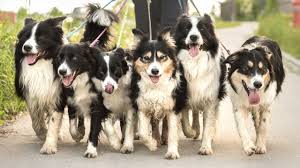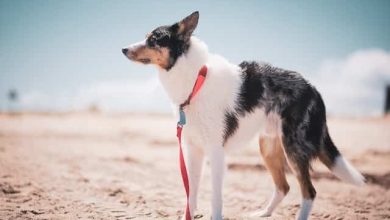Do Border Collies Come From Wolves


The relationship between dogs and wolves has long fascinated researchers and dog enthusiasts alike. Border Collies, known for their remarkable intelligence and herding capabilities, often generate questions about their ancestry and possible connections to wolves. In this article, we delve into the origins of Border Collies, explore any evolutionary links to wolves, and shed light on the impact of wolf ancestry on these remarkable dogs.
The Origin of Border Collies
To understand the potential connection between Border Collies and wolves, we must first trace the breed’s early history. Sheepdogs have played a crucial role in managing livestock for centuries, and their development can be traced back to ancient times.
Early History of Sheepdogs
Sheepdogs have existed for thousands of years, with evidence of their presence dating back to ancient Egypt and Mesopotamia. These early dogs were primarily employed for herding and protecting livestock, serving as invaluable companions to humans in agricultural societies.
Emergence of the Border Collie
The Border Collie, as we know it today, emerged in the Anglo-Scottish border region during the 18th century. The breed’s name originates from its close association with the border between England and Scotland. Border Collies were specifically bred for their herding skills, and their exceptional intelligence and work ethic quickly set them apart.
Evolutionary Links of Border Collies to Wolves
The question of whether Border Collies have any evolutionary links to wolves is a complex one. While dogs, including Border Collies, share a common ancestor with wolves, the specific connection between the two species requires a closer examination.
Genetic Similarities of Border Collies with Wolves
Research has shown that domestic dogs, including Border Collies, share a significant portion of their DNA with wolves. However, it’s important to note that thousands of years of selective breeding have led to substantial genetic divergence between the two. Border Collies exhibit genetic variations that are unique to the breed, distinguishing them from their wild counterparts.
Behavioral Traits of Border Collies with Wolves
Border Collies and wolves do share some behavioral traits, such as their herding instincts, pack mentality, and remarkable intelligence. These similarities can be attributed to the ancient working and social behaviors common to both dogs and wolves. However, it’s crucial to recognize that Border Collies have been selectively bred for specific traits, resulting in distinct behavior patterns that differ from those of wolves.
The Relationship Between Border Collies and Wolves
The relationship between Border Collies and wolves is primarily one of shared ancestry rather than direct kinship. Domestication and selective breeding have played a significant role in shaping the characteristics of Border Collies and differentiating them from their wild counterparts.
Domestication and Selective Breeding
Through domestication, humans have selectively bred dogs for various purposes, including herding, companionship, and protection. Border Collies were selectively bred for their exceptional herding abilities, with generations of shepherds carefully choosing the best working dogs to produce the next generation. This deliberate breeding program has resulted in the unique set of traits seen in Border Collies today.
Common Traits and Characteristics of Border Collies and Wolves
While Border Collies and wolves may share some common traits, such as intelligence and pack-oriented behavior, it’s important to emphasize that these traits have been refined and enhanced through selective breeding. Border Collies possess a distinct set of characteristics that make them highly adept at herding tasks, such as their intense focus, agility, and the ability to anticipate the movements of livestock.
The Impact of Wolf Ancestry on Border Collies
The influence of wolf ancestry on Border Collies is a topic of ongoing debate among experts. While the genetic connection exists, the specific impact of wolf ancestry on Border Collie behavior and traits is not as pronounced as some may assume.
See also: Great Pyrenees: The Majestic Big White Fluffy Dog Breed and Its Unique Characteristics
Working Abilities and Herding Instincts
Border Collies’ working abilities and herding instincts can be attributed to a combination of their genetic heritage and selective breeding. While their shared ancestry with wolves might contribute to certain behavioral traits, it’s the careful breeding practices of shepherds that have cultivated and refined these skills over generations.
Behavioral Differences between Border Collies and Wolves
Although Border Collies exhibit certain traits reminiscent of their wolf ancestors, such as their intelligence and pack mentality, they also display distinct behavioral differences. Border Collies have been specifically bred for their cooperative nature, trainability, and strong desire to work closely with their human handlers. These traits have been instrumental in their success as working dogs and beloved companions.
Debunking Myths between Border Collies and Wolves
When discussing the relationship between Border Collies and wolves, it’s important to address common misconceptions and debunk myths that may perpetuate misunderstandings.
Misconceptions About Border Collie Origins
One common misconception is that Border Collies are direct descendants of wolves. While they share a common ancestor, the evolutionary paths of wolves and Border Collies diverged thousands of years ago through selective breeding and domestication.
Clarifying the Connection to Wolves
While Border Collies have a genetic connection to wolves, their shared ancestry should not be misinterpreted as a direct relationship. The unique characteristics and traits displayed by Border Collies are the result of selective breeding and the specific goals of shepherds.
Conclusion
In conclusion, Border Collies do not come directly from wolves, but they do share a common ancestor. Through selective breeding and domestication, Border Collies have developed into a distinct breed with specialized traits and abilities. While the influence of wolf ancestry can still be observed to some extent, it’s crucial to recognize that Border Collies have been shaped by human intervention and purposeful breeding. Understanding the evolutionary history and relationship between Border Collies and wolves enhances our appreciation for these remarkable dogs and their exceptional herding skills.
See also: What 2 breeds make a Border Collie?
FAQs about Border Collies in comparison with wolves
Are Border Collies part wolf?
Border Collies share a genetic connection with wolves but are not direct descendants of wolves. Selective breeding and domestication have shaped the breed’s characteristics.
Can Border Collies interbreed with wolves?
No, interbreeding between Border Collies and wolves is not possible due to the genetic differences that have developed through selective breeding and domestication.
Do Border Collies share any physical characteristics with wolves?
While Border Collies may display some physical similarities with wolves, such as coat color and body shape, they have been selectively bred to exhibit distinct traits unique to the breed.
Is there a specific wolf breed that Border Collies are related to?
Border Collies share ancestry with various wolf subspecies, but there is no specific wolf breed to which they are exclusively related.
How does wolf ancestry affect the temperament of Border Collies?
The influence of wolf ancestry on the temperament of Border Collies is minimal. Border Collies have been selectively bred for specific traits, resulting in their own distinct temperament, which prioritizes working ability, trainability, and cooperation with humans.





